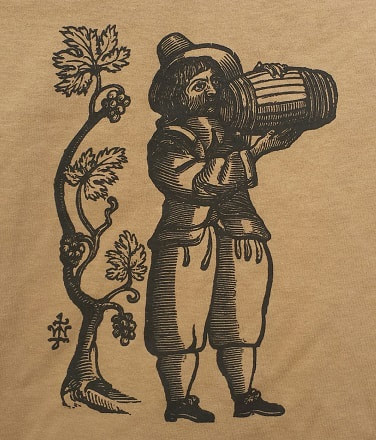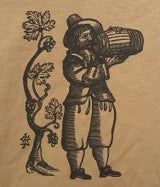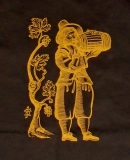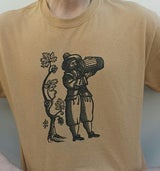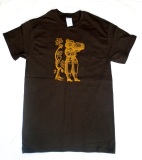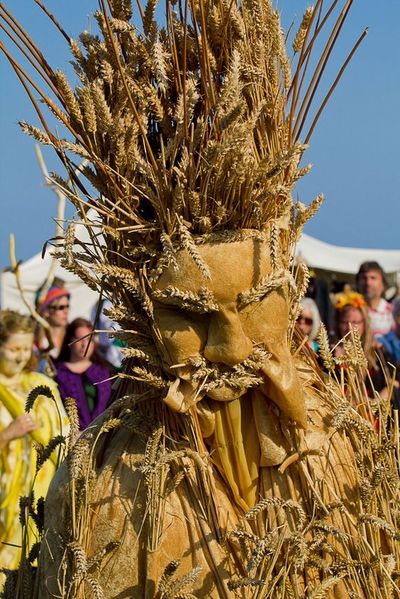John Barleycorn
SKU:
£17.85
£17.85
Unavailable
per item
Gildan, 100% cotton.
The John Barleycorn figure has long held a symbolic and mythogical significance as, among other things, the personification of the grain barley and its’ embodiment in alcohol. The process of the transformation of the grain into alcohol also contains intimations of fertility, death and resurrection. Out of the death of one substance comes the birth of a new one. It has even been suggested that the character represents the Anglo-saxon pagan figure Beowa. It is perhaps telling that Jack London gave his alcoholic memoirs the same title.
The folk song John Barleycorn (Roud 164) has been performed and recorded many times by, among others, Martin Carthy, The Watersons, and Traffic. It exists in many variants from at least the early seventeenth century, and the words reprinted here are those sung by Carthy. The song has been interpreted on many different levels, and at its’ simplest is an account of drinking and its’ unwelcome consequences. The version here is the delicate, jazzy one by Traffic:
Oh there were three men came out of the west
Their fortunes for to try,
And these three men made a solemn vow:
John Barleycorn should die.
They ploughed, they sowed, they harrowed him in,
Throwed clods upon his head.
Then these three men made a solemn vow:
John Barleycorn was dead.
They let him lie for a very long time
Till the rain from heaven did fall.
Then little Sir John he raised up his head
And he soon amazed them all.
They let him lie till the long midsummer
Till he looked both pale and wan.
Then little Sir John growed a long, long beard
And so became a man.
They hired men with the scythes so sharp
To cut him off down by the knee.
They rolled him and tied him around by the waist,
Served him most barbarously.
They hired men with the sharp pitchforks
Who pierced him to the heart.
But the loader, he served him far worse than that
For he bound him to the cart.
They rode him around and around the field
Till they came into a barn,
And there they made a solemn mow
Of poor John Barleycorn.
They hired men with the crab-tree sticks
Who cut him skin from bone
But the miller, he served him far worse than that
For he ground him between two stones.
Here's little Sir John in the nut-brown bowl
And brandy in a glass.
And little Sir John in the nut-brown bowl
Proved the stronger man at last.
For the hunter, he can't hunt the fox
Nor so loudly blow his horn,
And the tinker, he can't mend his kettles or his pots
Without a little bit of John Barleycorn.
Whaterever the truth of its’ origins and meaning it remains both a compelling legend and song.
Their fortunes for to try,
And these three men made a solemn vow:
John Barleycorn should die.
They ploughed, they sowed, they harrowed him in,
Throwed clods upon his head.
Then these three men made a solemn vow:
John Barleycorn was dead.
They let him lie for a very long time
Till the rain from heaven did fall.
Then little Sir John he raised up his head
And he soon amazed them all.
They let him lie till the long midsummer
Till he looked both pale and wan.
Then little Sir John growed a long, long beard
And so became a man.
They hired men with the scythes so sharp
To cut him off down by the knee.
They rolled him and tied him around by the waist,
Served him most barbarously.
They hired men with the sharp pitchforks
Who pierced him to the heart.
But the loader, he served him far worse than that
For he bound him to the cart.
They rode him around and around the field
Till they came into a barn,
And there they made a solemn mow
Of poor John Barleycorn.
They hired men with the crab-tree sticks
Who cut him skin from bone
But the miller, he served him far worse than that
For he ground him between two stones.
Here's little Sir John in the nut-brown bowl
And brandy in a glass.
And little Sir John in the nut-brown bowl
Proved the stronger man at last.
For the hunter, he can't hunt the fox
Nor so loudly blow his horn,
And the tinker, he can't mend his kettles or his pots
Without a little bit of John Barleycorn.
Whaterever the truth of its’ origins and meaning it remains both a compelling legend and song.

